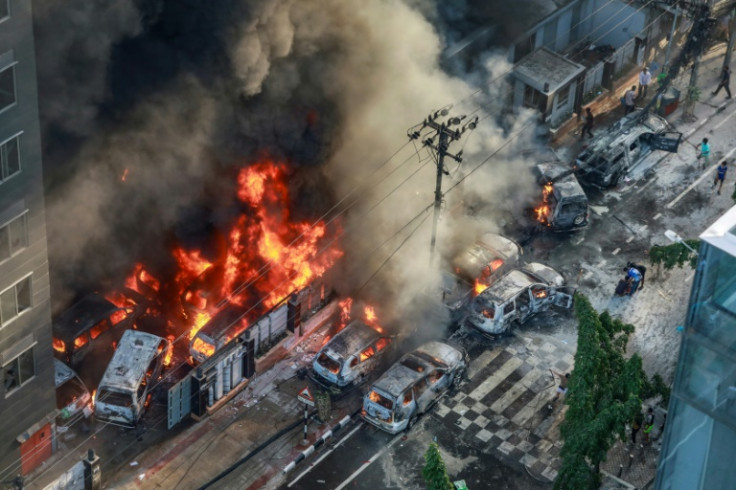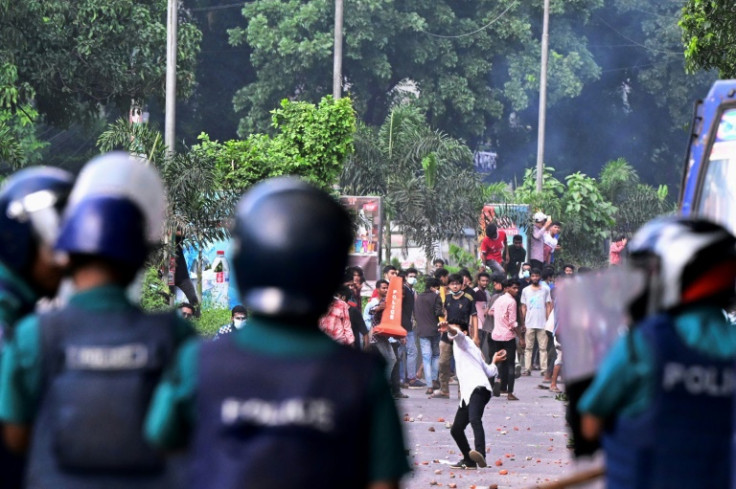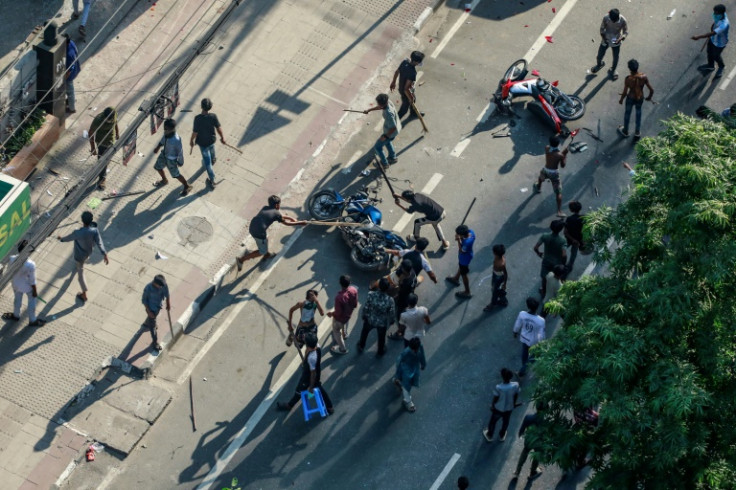Bangladesh Capital Bans Rallies After Government Buildings Torched

Police in Bangladesh's capital banned all public rallies on Friday after the deadliest day of ongoing student protests so far saw government buildings torched by demonstrators and the imposition of a nationwide internet blackout.
This week's unrest has killed at least 39 people, including 32 on Thursday, with the toll expected to rise after reports of clashes in nearly half of the country's 64 districts.
Students took to the streets again on Friday morning ahead of pro-government counter-demonstrations slated to begin after midday prayers in the Muslim-majority nation.
Dhaka's police force took the drastic step of banning all public gatherings for the day -- a first since protests began -- in an effort to forestall another day of violence.
"We've banned all rallies, processions and public gatherings in Dhaka today," police chief Habibur Rahman told AFP, adding the move was necessary to ensure "public safety".
Dhaka Metropolitan Police spokesman Faruk Hossain told AFP that officers had arrested Ruhul Kabir Rizvi Ahmed, the joint secretary of the main opposition Bangladesh Nationalist Party (BNP).
"He faces hundreds of cases," Hossain said, without giving further details on the reasons for Ahmed's detention.
Police in the capital earlier said protesters had torched, vandalised and carried out "destructive activities" on numerous police and government offices.
Among them was the Dhaka headquarters of state broadcaster Bangladesh Television, which remains offline after hundreds of incensed students stormed the premises and set fire to a building.
"About 100 policemen were injured in the clashes yesterday," Hossain told AFP. "Around 50 police booths were burnt".
Police fire was the cause of at least two-thirds of deaths reported so far this week, based on descriptions given to AFP by hospital staff.
Busy streets around the capital were deserted at daybreak on Friday but showed signs of the previous night's mayhem, with burnt vehicles and bricks thrown by protesters strewn across the roads.
Fresh confrontations broke out between police and protesters around Dhaka later in the morning.
Hundreds of students blockaded roads in the upscale commercial district of Banani, an AFP correspondent at the scene saw.
Witnesses also reported police firing tear gas at several locations around the crowded megacity of 20 million people.
At least 26 districts around the country reported clashes on Thursday, broadcaster Independent Television reported.
The network said more than 700 people had been wounded throughout the day including 104 police officers and 30 journalists.
London-based watchdog Netblocks said Friday that a "nation-scale" internet shutdown remained in effect.
"The disruption prevents families from contacting each other and stifles efforts to document human rights violations," it wrote on social media platform X.
Near-daily marches this month have called for an end to a quota system that reserves more than half of civil service posts for specific groups, including children of veterans from the country's 1971 liberation war against Pakistan.
Critics say the scheme benefits children of pro-government groups that back Prime Minister Sheikh Hasina, 76, who has ruled the country since 2009 and won her fourth consecutive election in January after a vote without genuine opposition.
Hasina's government is accused by rights groups of misusing state institutions to entrench its hold on power and stamp out dissent, including by the extrajudicial killing of opposition activists.
Her administration this week ordered schools and universities to close indefinitely as police stepped up efforts to bring the deteriorating law and order situation under control.
"This is an eruption of the simmering discontent of a youth population built over years due to economic and political disenfranchisement," Ali Riaz, a politics professor at Illinois State University, told AFP.
"The job quotas became the symbol of a system which is rigged and stacked against them by the regime."
Students have vowed to continue their campaign despite Hasina giving a national address on the now-offline state broadcaster seeking to calm the unrest.
"Our first demand is that the prime minister must apologise to us," protester Bidisha Rimjhim, 18, told AFP on Thursday.
"Secondly, justice must be ensured for our killed brothers," she added.


© Copyright AFP 2025. All rights reserved.





















